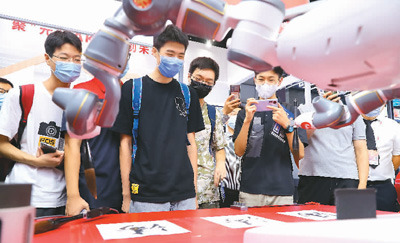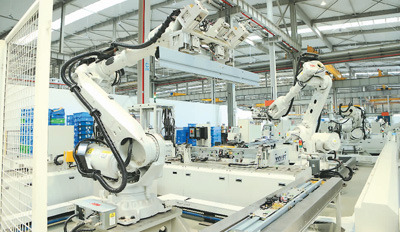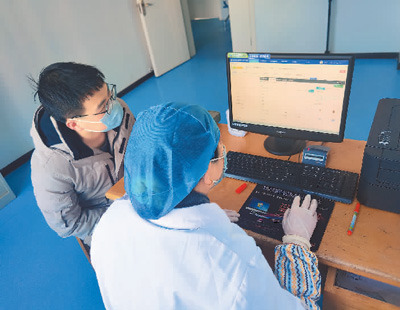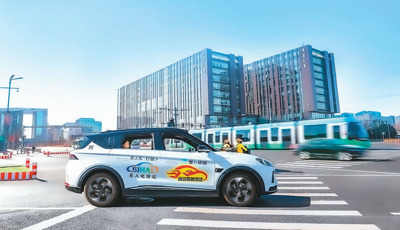China has achieved progress in the artificial intelligence (AI) industry.
A complete AI industrial system has been created in the country, and AI has become a new growth driver.

Visitors watch an artificial intelligence robot perform calligraphy at the 2022 World Artificial Intelligence Conference. (Xinhua/Fang Zhe)
The value of the core sectors of the country’s AI industry reached 508 billion yuan ($74 billion) in 2022, up 18 percent year on year, and the number of related enterprises approached 4,000.
A total of 102,000 AI-related patents, or 41.7 percent of those authorized in the world between 2013 and November 2022, came from China, according to the China Academy of Information and Communications Technology (CAICT). Chinese researchers published 50.71 percent of all high-level AI journal papers worldwide in 2021, up from 20.36 percent in 2012.

Intelligent mechanical arms work in a smart factory in the Linping Economic and Technological Development Zone, Linping district, Hangzhou city, east China’s Zhejiang Province. (Photo/Dou Hanyang, Wang Jue)
Chinese enterprises have also made important breakthroughs in key technologies such as application algorithms, intelligent processors and open source frameworks. They are also leading the world in image recognition and voice recognition. A number of signature products, including intelligent sensors and intelligent connected vehicles, have hit the market.
AI is empowering various industries at an accelerated pace in China and is seeping into people’s daily lives.
An Hui, deputy chief engineer of the China Center for Information Industry Development, said that AI is well integrated with the primary, secondary and tertiary industries and is gradually seeping into the tourism and agriculture sectors following its application in healthcare, transport, and manufacturing.
Intelligent finance, healthcare, security and transport have become key areas of AI application, and the technology is also making smarter the designing, production, quality inspection and other key links of the manufacturing industry, An said.
Thanks to the application of AI in healthcare, Liu Guiping, a doctor at the health center of Jucheng township, Pingding county, north China’s Shanxi Province, can use a smart medical assistant system, which was developed by iFLYTEK, a Chinese artificial intelligence firm, and Tsinghua University, to provide diagnosis and treatment.

A doctor uses a smart medical assistant system developed by iFLYTEK, a Chinese artificial intelligence firm, and Tsinghua University, at the health center of Xiangshui town, Jingyuan county, northwest China’s Ningxia Hui Autonomous Region. (Photo courtesy of iFLYTEK)
When Liu put a patient’s current symptoms into the smart system, it suggested that the patient may have acute cholecystitis, acute cholangitis, and cholecystolithiasis with cholangitis.
Liu then carried out an abdomen ultrasound examination for the patient and found that he had multiple gallstones, advising him to go to a higher-level hospital for further examination and treatment.
Liu said the smart system is a good assistant to help grassroots doctors avoid missed diagnoses and misdiagnoses.
The smart system can help doctors diagnose 1,400 diseases. It has assisted 56,000 grassroots doctors in about 400 districts and counties across China in carrying out diagnosis services.
“The smart system can help grassroots doctors improve diagnostic accuracy and efficiency,” said an executive from iFLYTEK, explaining that it has so far provided AI-assisted medical diagnosis over 560 million times.
In terms of intelligent transport and autonomous driving, Beijing recently granted licenses to operate fully driverless robotaxi services to Apollo Go, Chinese tech giant Baidu’s autonomous ride-hailing platform.
Equipped with laser radars, cameras and millimeter-wave radars, Apollo Go’s robotaxis can “see” their surroundings clearly in different road conditions, an executive from Baidu said.
Apollo Go has launched fully driverless robotaxi services in three Chinese cities—Beijing, Wuhan and Chongqing. The company is promoting the large-scale application of its autonomous ride-hailing services.

An Apollo Go robotaxi, developed by Chinese tech giant Baidu, drives on a street in the Beijing Economic-Technological Development Area. (Photo courtesy of Baidu)
The increasingly wide application of AI can be attributed to enterprises’ solid technological foundation and long-term input.
Baidu has been engaging in autonomous driving research and development since 2013 and has accumulated more than 50 million kilometers of testing mileage on Level 4 autonomous driving. It currently holds over 4,600 patent families for autonomous driving technology.
In November 2017, iFLYTEK’s smart medical assistant system passed the written test of the national qualification exam for clinical practitioners with a score of 456, higher than that of 96.3 percent of the human candidates that year. It is still the only AI system that passed the country’s written national qualification exam for doctors.
Editor: Xiao Da




